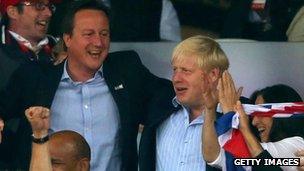Boris Johnson urges two hours of PE a day
- Published
- comments

Mr Johnson said widening participation in sport after the Games was of "profound" importance.
School children should be made to do two hours of sport a day as part of the Olympic legacy, Boris Johnson has said.
The London mayor wants to build on the public's renewed appetite for sport, adding it would be "wonderful for kids across this country".
The coalition has been criticised for removing the requirement that schools in England provide pupils with at least two hours of sport a week.
But it has pledged £1bn investment in school sports in the next few years.
Labour has called for the two-hour-a-week target to be re-introduced and a cross-party 10-year school sports plan agreed to ensure a grass-roots legacy for the Games.
Speaking at a press conference on the Olympic legacy, Mr Johnson said: "The government totally understands people's appetite for this, they can see the benefits of sport and what it does for young people.
"They understand very, very clearly the social and economic advantages.
"I would like to see, frankly, the kind of regime I used to enjoy - compulsory two hours' sport every day.
"I've no doubt that is the sort of thing that would be wonderful for kids across this country.
"It is of profound importance for the happiness and success of this country that we have more sport in schools."
'Life changing'
Dame Tessa Jowell - Culture Secretary at the time London won the Olympic bid - told BBC Radio 4's Today programme she wanted "a very clear agreement that a chunk of time every week" would be set aside for children to play sports.
She also urged all parties to sign up to a 10-year school sports plan, stretching beyond the next general election, to ensure stability.
"We promised in Singapore, when we won the bid, that we would inspire a generation and that would be creating sport as part of every child's life; life changing and something we'd never done before in that concerted way.
"One of the reasons the Olympics has been so successful, I think, is that in their planning and execution all the parties have worked together in the national interest and built a national consensus about how to deliver the Olympics.
"I think that sense of unity of purpose should be applied to delivering this legacy."
'Bottling the spirit'
The Department for Education allocates funding for school sports provision in England, while the devolved administrations take on the responsibility in Northern Ireland, Scotland and Wales.
In 2010 the government faced criticism from teachers and athletes when it cut funding for the Schools Sports Partnership programme - set up by Labour.
The programme supported joint initiatives between primary, secondary and specialist state schools designed to increase sporting opportunities for children, but ministers argued it had done too little to increase young people's involvement in competitive sports.
Downing Street said the government was committed to ensuring the Games had a lasting legacy and was spending £1bn on a five-year youth sports strategy.
Culture Secretary Jeremy Hunt said the Olympics was inspiring millions of young people but insisted targets in education "don't always get you the results that you want".
He told BBC Radio 4's World At One: "It's about culture, it's about empowering teachers, empowering heads and getting an ethos inside schools, and particularly when it comes to sport it's about an understanding of the role of competitive sport, of team sport, and the values that can give to young people."
The government would be bringing forward plans to make sure more young people take part in competitive sport, Mr Hunt added.
But shadow education secretary Stephen Twigg accused the government of being "out of touch" on school sport by not backing the two-hour target.
"Everyone who loves sport agrees we need to ensure pupils get enough hours of PE every week," he said.
Discussing the legacy of the Olympics, on BBC Radio 2, Prime Minister David Cameron said "bottling" the volunteering spirit demonstrated by those working across the Olympic venues was also "vital".
Both Mr Cameron and Ms Jowell said they hoped the volunteers would get involved in a new charity Join in Local Sport, external which is helping thousands of clubs and community groups throw open their doors to "capture the enthusiasm" for sport after the Olympics.
Mr Cameron also said it was important the UK maintained its system of funding and support for elite sports and praised the "very tough" conditions set by UK Sport - the organisation responsible for investing government money in Britain's top performers.
- Published9 August 2012
- Published8 August 2012
- Published6 August 2012